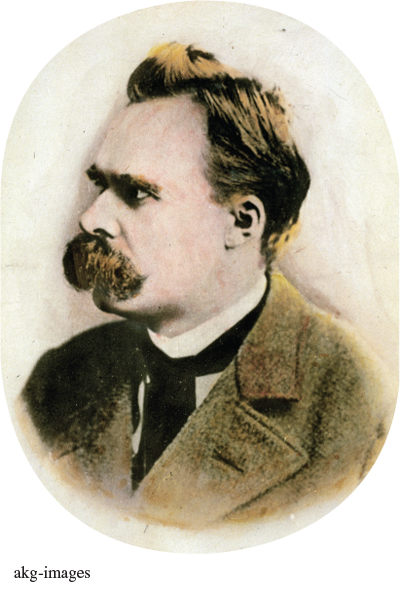A History of Western Society: Printed Page 868
A History of Western Society, Value Edition: Printed Page 833
A History of Western Society, Concise Edition: Printed Page 868
Modern Philosophy
Before 1914 most people still believed in Enlightenment ideals of progress, reason, and individual rights. At the turn of the century supporters of these philosophies had some cause for optimism. Women and workers were gradually gaining support in their struggles for political and social recognition, and the rising standard of living, the taming of the city, and the growth of state-

Nevertheless, in the late nineteenth century a small group of serious thinkers mounted a determined attack on these optimistic beliefs. These critics rejected the general faith in progress and the rational human mind. The German philosopher Friedrich Nietzsche (NEE-
Nietzsche questioned the conventional values of Western society. He believed that reason, progress, and respectability were outworn social and psychological constructs that suffocated self-
Nietzsche painted a dark world, perhaps foreshadowing his own loss of sanity in 1889. He warned that Western society was entering a period of nihilism — the philosophical idea that human life is entirely without meaning, truth, or purpose. Nietzsche asserted that all moral systems were invented lies and that liberalism, democracy, and socialism were corrupt systems designed to promote the weak at the expense of the strong. The West was in decline; false values had triumphed; the death of God left people disoriented and depressed. According to Nietzsche, the only hope for the individual was to accept the meaninglessness of human existence and then make that very meaninglessness a source of self-
Little read during his active years, Nietzsche’s works attracted growing attention in the early twentieth century. Artists and writers experimented with his ideas, which were fundamental to the rise of the philosophy of existentialism in the 1920s. Subsequent generations remade Nietzsche to suit their own needs, and his influence remains enormous to this day.
The growing dissatisfaction with established ideas before 1914 was apparent in other important thinkers as well. In the 1890s French philosophy professor Henri Bergson (1859–1941), for one, argued that immediate experience and intuition were as important as rational and scientific thinking for understanding reality. According to Bergson, a religious experience or mystical poem was often more accessible to human comprehension than a scientific law or a mathematical equation.
The First World War accelerated the revolt against established certainties in philosophy, but that revolt went in two very different directions. In English-
Logical positivism was truly revolutionary. Adherents of this worldview argued that what we know about human life must be based on rational facts and direct observation. They concluded that theology and most traditional philosophy were meaningless because even the most cherished ideas about God, eternal truth, and ethics were impossible to prove using logic. This outlook is often associated with the Austrian philosopher Ludwig Wittgenstein (VIHT-
In his pugnacious Tractatus Logico-
On the continent, others looked for answers in existentialism. This new philosophy loosely united highly diverse and even contradictory thinkers in a search for usable moral values in a world of anxiety and uncertainty. Modern existentialism had many nineteenth-
Most existential thinkers in the twentieth century were atheists. Often inspired by Nietzsche, they did not believe that a supreme being had established humanity’s fundamental nature and given life its meaning. In the words of French existentialist Jean-
At the same time, existentialists recognized that human beings must act in the world. Indeed, in the words of Sartre, “man is condemned to be free.” Because life is meaningless, existentialists believe that individuals are forced to create their own meaning and define themselves through their actions. Such radical freedom is frightening, and Sartre concluded that most people try to escape it by structuring their lives around conventional social norms. According to Sartre, to escape is to live in “bad faith,” to hide from the hard truths of existence. To live authentically, individuals must become “engaged” and choose their own actions in full awareness of their responsibility for their own behavior. Existentialism thus had a powerful ethical component. It placed great stress on individual responsibility and choice, on “being in the world” in the right way.
Existentialism had important precedents in the late nineteenth and early twentieth centuries, but the philosophy really came of age in France during and immediately after World War II. The terrible conditions of that war, discussed in the next chapter, reinforced the existential view of and approach to life. After World War II, French existentialists such as Sartre and Albert Camus (1913–1960) became enormously influential. They offered powerful but unsettling answers to the profound moral issues and the crises of the first half of the twentieth century.